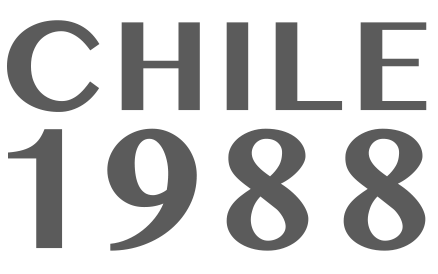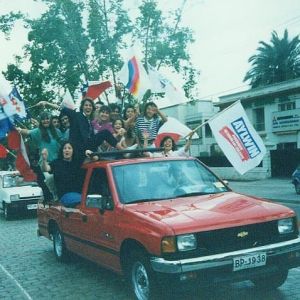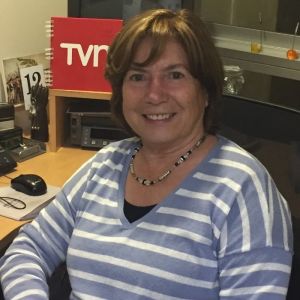The memories I have are always accompanied by a bit of fear of working at TVN, which was the channel controlled by the dictatorship, while being opposed to the dictatorship and voting “No.” I remember that in 1975, there was a manager who wanted to erase a lot of historical material. So he told me, “Bring me all the files where Salvador Allende, Pablo Neruda, Fidel Castro, and the Popular Unity are mentioned.” And I brought him the material, and he said, “Out, out, out, out, out.” When I returned to his office, I said, “But how can we erase the award ceremony of Pablo Neruda’s Nobel Prize? It’s impossible. And Fidel Castro, I don’t think he’s going to come to Chile for many years. And how can we erase Salvador Allende’s official visits?” I kept the files, I kept them. And if the material wasn’t listed in the catalog, it was very difficult to find it among the reels of tape. So, with that material, fortunately, a part of this country’s history that was very important was eventually preserved. I mean, how could you erase everything that had been the government of the Popular Unity?, whether you liked it or not, whether you liked or disliked the dictatorship. Because if you liked it, you could say, “look, this is what happened, it was all disorder and protests.” But if you disagreed, you could say, “This was a government chosen by the people, through free elections, and a socialist won.” It was all very historic. It was the first time something like this had happened in our country as well.
So, I kept all of that. Well, the campaign commercials didn’t originate from the channel itself. They were produced by two production companies and arrived on tapes directly to TVN’s continuity department. And since we made copies of everything that went on air, we copied the campaign commercials and kept them in the archive as a testimony of a very important period in which the decision was made whether to continue with Pinochet leading the country under a dictatorial system or to return the country to democracy. It was very, very important. As an archivist, I said, “This is one of the things that we must have in our archive.”
So, I remember the first personal surprise that I had, which was very strong, was when I entered a mall and they handed me pamphlets supporting the “Yes” vote, and I said “no, I’m going to vote No.” And then I realized that it had been a tremendous mistake to say that because it could have had consequences. Fortunately, it didn’t. And what I did, well, on several occasions before the “No” vote, to the extent that we could, with a group of friends who played sports, we participated in protests, or I should say, it wasn’t exactly protests, but for example, all of Santiago would unite with a yellow ribbon, and we would all hold the ribbon and walk around Santiago or in a silent march. But, of course, everyone was very scared because we didn’t know what would happen. And here at TVN, as I said, we were controlled by the dictatorship, so it was much more difficult.
And on the same day of the “No” vote, I was working with two people from my office. We worked all day with a lot of anxiety about what would happen because in my circle of friends, the “No” vote was clearly going to win by far. But when you entered the TV station, it was all about the “Yes” vote, the “Yes.” So you would think, “what crazy world am I living in? Where do I belong?” It was really surreal. And well, the broadcasts started, and I remember that during the process, I wore a white sweater that had a reading down here, like a border, and it said “Power People.” And there were many people, little figures, in a white sweater, black figures, and “Power People.” Obviously, it had nothing to do with the “No” vote, but I liked it, so I wore it that day, I don’t know, with some degree of intention. At that time, we had a director who was a military officer, and I remember that. Well, the broadcasts began, and at
some point, they took us to vote, which was also quite impressive because you believed that everyone was voting Yes. So I thought, “how do I mark ‘No’? Maybe they won’t see my vote.” Those were times when it was really difficult to be on the opposite side of the dictatorship. I remember they took us in a truck to vote here. We returned and went back to work, and the first vote counts started. And suddenly, I find myself in a hallway with the general director of the channel, who was a military officer, and he grabs my sweater where the “Power People” were and tells me, “We’re winning, young lady.” I said, “Where, General?” He replied, “In Purranque.” I don’t know if you’re familiar with Purranque, it’s a small town in southern Chile, I think it’s near Lake Caburga in Pucón. “Ah, that’s great,” I said, “that’s great.” But inside, in our office, those of us who were working and supported the “No” were very depressed, it felt like the Yes vote was winning everywhere. The Yes vote was winning everywhere, it was very strange, and when the No vote won, it was by a very small margin. So, I would think, “What’s happening?” And in our office, we didn’t dare to listen to the radio, we never listened to the radio.
Then later I encountered the same person again because I worked in front of the studios where they were broadcasting. So all the executives would pass by, and again the director said to me, “We’re winning, did you see that we’re winning?” And I said, “Where?”, “Easter Island” he replied. And I thought, well, he didn’t mention Santiago, Concepción, or Iquique, which are large cities that were massively against the dictatorship. Even today, the left-wing wins in Iquique. Well, I finished working around ten o’clock at night, maybe eleven o’clock, and someone came to pick me up, and I said, “How terrible, I feel such sorrow and anguish because the ‘Yes’ vote was winning for the internal people, for those of us who were working, and what TVN was broadcasting was in favor of the ‘Yes’ vote.” So I asked the person who picked me up, I said, “How did everything turn around? We had massive gatherings for the ‘No’ vote. Where are the people? What did the people do?” And the person said to me, “What are you talking about? Where are you coming from? What place?” I said, “But that’s what the channel is saying, that the ‘Yes’ vote is winning.” He said, “The ‘No’ vote has won everywhere.” I remember that we then went to a barbecue at a friend’s house where Patricio Bañados was, who was part of my friend’s group and was the one appearing in the campaign commercials. Everyone was celebrating, everyone was happy. And there I was, with an anguished expression on my face, thinking, “But how can this be?” It was a mixture of feelings between the deception of the day and the joy of knowing that the ‘No’ vote had truly won. So we rested, and the children in the house, there were three of them, would take turns bringing us updates on the cities where the ‘No’ vote was winning and how many votes the ‘Yes’ vote was getting.
So, when I left that channel and went home on Eliodoro Yáñez Street, this Santiago, it was like a desert. It was quite impactful at night because there were no people on the streets, houses dimly lit, but we didn’t know what was really happening. And when our channel finally acknowledged the victory of the ‘No’ vote, the broadcasts went off, they ended. And the day was over, and I tell you, the next day was pure joy. We all went out to celebrate, and we celebrated throughout Santiago. It was quite impactful because it felt like stepping out. My feeling was like being in a tunnel where we couldn’t see the light, and suddenly, with the ‘No’ campaign, a glimmer of hope began to appear that maybe this could change. And for me, working with the archives had been very significant during that time because when you work in unilateral archives, it’s very difficult when you want to catalog material accurately, and there’s a journalist from the dictatorship, serving the dictatorship, who tells you, “No, that’s terrorism,” and you say, “But it was the military who entered the house,” and they respond, “No, label it with a ‘T’ because it’s a terrorist act.” So, when you want to work differently, in my case, I was never in agreement with the dictatorship, never. Because of the human rights violations, the injustice, everything. I couldn’t, I couldn’t accept it. But it was also a very difficult situation because you think, “what do I do at TVN?” It was either taking up arms and going underground or staying here and working calmly, doing everything I had to do. However, I did my work professionally and conscientiously. I never used my feelings or thoughts to undermine the work I had to do. Sometimes I had to search for images of Pinochet smiling because they were going to use them in a commercial, and I would find them. It was part of the job, you see, it was part of the job. But those were very difficult moments, and they were later compensated, rewarded, with the return to democracy. The country started, I feel, to grow, but the return to democracy was also quite painful because many cases of disappeared detainees started to surface, cases that people were afraid to talk about before.
And I believe that one of the valuable things that President Aylwin did was to create the Rettig Commission. The President made it known to the country, and you think, “Yes, we needed to know.” That’s why I kept many archival images because I thought that at some point, those images would be useful for a historical reconstruction, to show Chile without a political agenda, without revenge, without anything like that. Instead, it would be for the children who were born and who, at that time when we returned to democracy, were eighteen years old or so, to tell them that Chile was democratic and that this is what happened in our country before. So, I feel very happy with the work and the historical recovery, because it was deep research that we conducted in the archives, finding images, finding images. After the coup, the military entered the documentation center, which was not what it is now, very small and film-based. They burned the films, so we never knew what we lost. But it was also very difficult because they wanted to justify the military coup and say that the disorder, the protests, the chaos, the shortages that happened during the Popular Unity government, there were no images to illustrate that because they burned a lot of material. Well, the satisfaction you have first is that your stance, your position, won, and the other satisfaction is having contributed with the images to the historical reconstruction of that entire period for future generations. I believe they should be preserved there for public consultation.
When the “No” campaign won, there is a photo of me waving the “No” flag inside the channel. I never expected someone to take a photo of me, but the joy of winning, of having, as I said, returned to democracy, was so overwhelming. Perhaps the most indescribable moment of happiness for me was entering the channel and not seeing an armed guard. For seventeen years, we would enter the aisles with armed guards, and you would see them carrying pistols in their pockets while waiting in line at the cafeteria. It had become a part of our daily lives, a part of the landscape. But on the first day, the day after the “No” victory, I couldn’t believe it. That was very significant to me.
The fact that the “No” campaign won and democracy was restored, I felt that it reaffirmed me as a person. I was no longer just an entity walking down the street, fearing that at any moment someone would demand my identification and if I didn’t have it, boom, I would be in trouble. Because I remember once, back in early ’73, I was in Uruguay with a friend, filming a statue, and a military officer with a machine gun approached us and said, “You can’t be here, boom! Move along.” I told my friend, “I don’t think something like that will ever happen to us.” And three months later, we experienced the coup d’état. So, of course, when you study history, you realize that this was happening all over Latin America—military coups. Therefore, returning to democracy meant returning to being a person, being credible, loving yourself again, and trying to pursue the dreams that were once cut short. I never dreamt of being a revolutionary or anything like that. I never joined a political party either. But there was this wish to be great. I would say, “I’m not afraid.” That, I believe, has been the most important thing: overcoming fear. Because we had lost our capacity for amazement and had gained fear within ourselves. We were… I think we were completely shattered in that regard. But now we are back.


